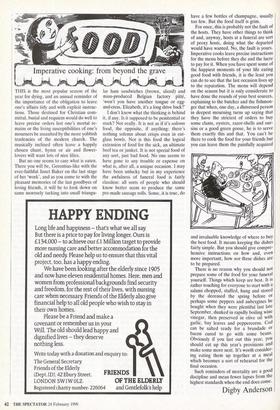Imperative cooking: from beyond the grave
L4Le al "Lfinlik%
THIS is the most popular season of the year for dying, and an annual reminder of the importance of the obligation to leave one's affairs tidy and with explicit instruc- tions. Those destined for Christian com- mittal, burial and requiem would do well to leave precise orders lest one's mortal re- mains or the living susceptibilities of one's mourners be assaulted by the more yobbish tendencies of the modern church. The musically inclined often leave a happily chosen chant, hymn or air and flower- lovers will want lots of nice lilies.
But no one seems to care what is eaten. There you will be, Gerontius-like with the ever-faithful Janet Baker on the last stage of her 'work', and as you come to with the pleasant memories of the last goodbyes of loving friends, it will be to look down on same morosely tucking into small triangu-
lar ham sandwiches (brown, sliced) and mass-produced Belgian factory pate, 'won't you have another tongue or egg- and-cress, Elizabeth, it's a long drive back?'
I don't know what the thinking is behind it, if any. Is it supposed to be penitential or stark? Not really. It is not as if it's solemn food, the opposite, if anything: there's nothing solemn about crisps even in cut- glass bowls. Nor is this food the logical extension of food for the sick, an ultimate beef tea or junket. It is not special food of any sort, just bad food, No one seems to have gone to any trouble or expense on what is, after all, a unique occasion. I may have been unlucky but in my experience the awfulness of funeral food is fairly classless: all sorts of people who should know better seem to produce the same pre-made sausage rolls. Some, it is true, do
have a few bottles of champagne, usually too few. But the food itself is grim.
For once, this is probably not the fault of the hosts. They have other things to think of and, anyway, hosts at a funeral are sort of proxy hosts, doing what the departed would have wanted. No, the fault is yours. Imperative cooks leave precise instructions for the menu before they die and the lucre to pay for it. When you have spent some of the happiest moments of your life eating good food with friends, it is the least you can do to see that the last occasion lives up to the reputation. The menu will depend on the season but it is only considerate to have done the rounds of your best sources, explaining to the butcher and the fishmon- ger that when, one day, a distressed person in deepest mourning turns up saying that they have the strictest of orders to buy some clams, oysters, razor-shells and our- sins or a good green goose, he is to serve them exactly this and that. You can't be there to cook the food for your friends but you can leave them the painfully acquired and invaluable knowledge of where to buy the best food. It means keeping the dishes fairly simple. But you should give compre- hensive instructions on how and, even more important, how not these dishes are to be prepared.
There is no reason why you should not prepare some of the food for your funeral yourself. Things which keep are best. It is rather touching for everyone to start with a salami chopped, stuffed, hung and stored by the deceased the spring before or perhaps some peppers and aubergines he bought when they were plentiful last late September, dunked in rapidly boiling wine vinegar, then preserved in olive oil with garlic, bay leaves and peppercorns. Cod can be salted ready for a brandade or bacon cured to go with some beans. Obviously if you last out this year, you should eat up this year's provisions and make some more next. It's worth consider- ing eating them up together at a meal which becomes a sort of rehearsal for the final occasion.
Such reminders of mortality are a good discipline and mean fewer lapses from the highest standards when the end does come.
Digby Anderson


















































 Previous page
Previous page